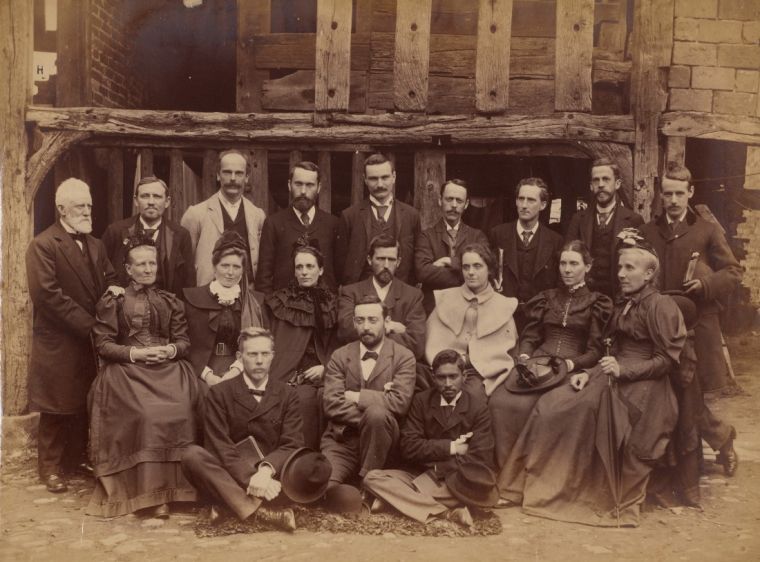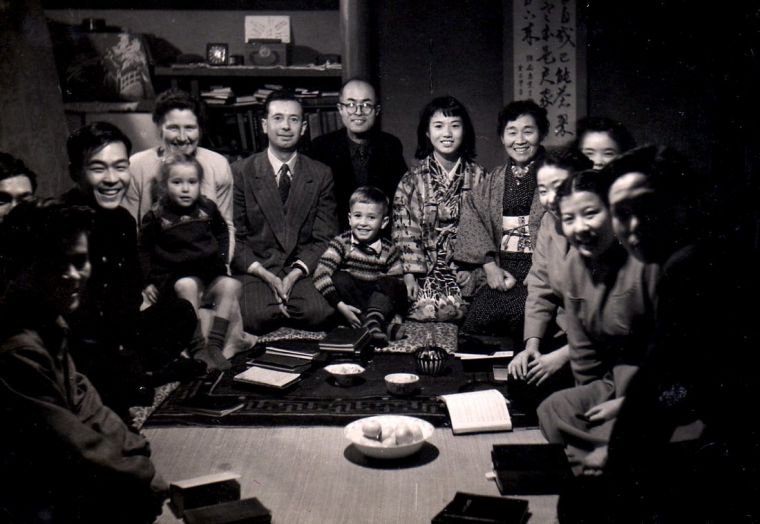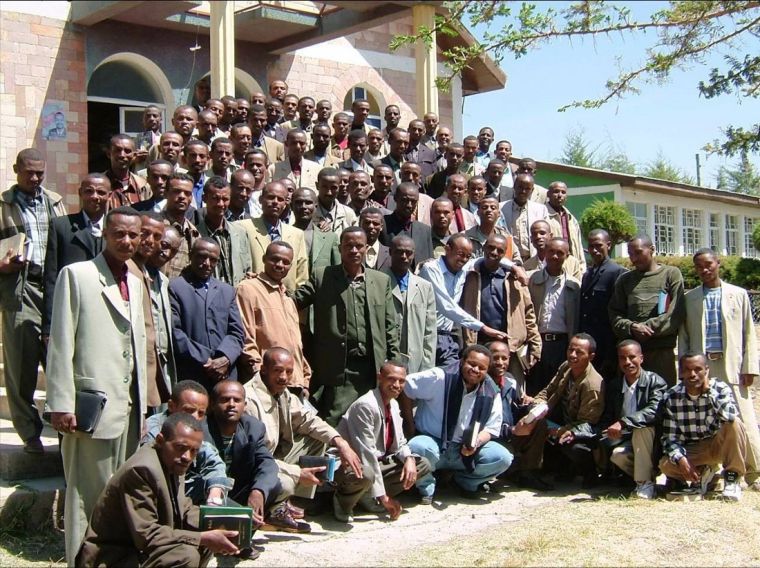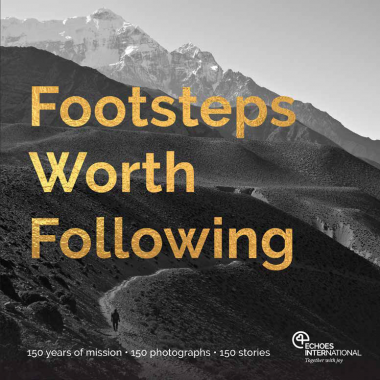Changing world, changing missions

Since 1872, Echoes International has been sending missionaries out into the mission field to share the Good News and bring people into a loving relationship with Jesus Christ.
In that time, over 6,000 men and women have been supported as mission partners, among them Stuart K Hine, who wrote the hymn, How Great Thou Art.
In 2018 Echoes of Service, as it was formerly known, merged with Interlink to become Echoes International.
This year, Echoes is celebrating its 150th anniversary with special projects, exhibitions and Footsteps Worth Following, a special book of photographs and stories charting the mission agency's history.
The world has changed since the agency's founding and so too has the nature of missions. Christian Today speaks to Jim Armstrong, General Director of Echoes International, about some of these changes and the legacy he wants the agency to leave for the next generation.
CT: How do you feel reaching such a milestone?
Jim: It's great to be able to look back and see what God has done over the last 150 years, but it's less about celebrating and taking pride in ourselves, and more about celebrating God's hands in the lives of thousands of men and women, and the legacy he has achieved. In that sense, it's a time of praise and worship as well as a time of challenge and looking forward. If you think back to 200 years ago, our ancestors responded to the call to go out to a world that needed the Gospel. Fast forward to 2022 and the population of the world is now almost 8 billion, and 42 per cent dont know Jesus and don't have access to the Gospel. The challenge to our generation is: what will our response be?
CT: What stands out as some highlights for you over the last 150 years?
Jim: In the course of the last 150 years, around 6,200-plus men and women have given up everything and gone and followed, living by faith. Within that group there have been doctors, teachers, nurses and all sorts of professionals who could have earned lots of money working in the UK but they gave it up to follow the command from their Saviour, often sacrificing a lot and living in challenging countries.
The second highlight is seeing God's faithfulness. Over the last 150 years, Echoes has never campaigned or appealed for money. It's just not in our DNA. Yet the trustees have been able to support mission partners each month with a gift. In that way Echoes is unique because other mission agencies typically require their missionaries to fundraise their costs. We don't work like that and it's just because of God's faithfulness.

CT: Looking back over the 150 years since Echoes International started, how do you think global missions has changed since those early years?
Jim: It's a really good question and it's probably a question that the Church is finding hard to get its head around. Around 150 to 200 years ago, when the modern missionary movement started, people just accepted God's call and went wherever they were sent. Anthony Norris Groves, for example, left the south-west of England, sailed to Baghdad and started preaching. He lost his wife and daughter in that process so there was a huge cost, but there was nothing stopping him from doing it.
With the rise of humanism and religious fundamentalism post-9/11, the world today is much more complex. It used to be that the West sent missionaries out but missions is actually everywhere now. For example, one of our missionaries was sitting in a park in Europe and met a refugee from Afghanistan who had never heard of Jesus and never held a Bible in his hand. He had never heard the message of the cross and now he can't get enough of it. Some 42 per cent of the world is unreached by the Gospel but they are all around the world.
Studies also suggest that in the next 20 to 30 years, 84 per cent of the world will be living in a city so there's a real opportunity to be involved in urban mission. Cities are hotspots for different nationalities so the opportunities for mission and to reach out cross culturally are huge. In the past missionaries would land at the coast and work their way inland, but it's different now. If you think about it, Christianity started in Jerusalem, then Judea, Samaria and the ends of the earth, so in some ways it's just going back to basics.
CT: What about hard to reach areas?
Jim: If you think about the stereotypical image of a missionary it might be someone in khakis in a jungle living by faith, but for hard to reach places, that model isn't really sustainable. Models of mission have changed and the business as mission model, for example, has made it possible for people to go to a difficult country and start a business but with a heart for mission. The business gives them legitimacy and access to a visa which then allows them to reach unreached people groups. Another model is to go to another country in a professional capacity and work as a teacher or engineer or doctor. We have two friends, for example, who have structured their career so that they can have 10 weeks off a year which they use to go and do missions.

Interestingly, the world is moving. The population of Europe is predicted to increase by millions and millions of people, with most of those coming from hard to reach areas like the Middle East and parts of Asia and Africa. I think God is bringing some of these unreached people groups to Europe where they can access the Gospel.
A few years ago there was a revival of Afghan churches in Germany. Things have changed a bit now but what they were saying at that time after they got saved was that they could take the Gospel back to Afghanistan and probably be more effective than somebody from the UK trying to take the Gospel to Afghanistan.
So, the means of how we go is also changing. In the past, when missionaries went to places like Africa or South America, they were kind of dictating and leading the charge. There's a real need now for Western missionaries to work alongside indigenous leaders, work in partnership, and be subject to elders in different countries rather than trying to dictate everything.
CT: Do you think the dawn of the digital era has changed missions in recent decades?
Jim: Places that are hostile to the Gospel might not let a missionary in but they can't stop the internet or someone from using a VPN. There are lots of stories coming out of the Middle East and Asia of people just desperate to hear the Gospel. A few months ago, I met a couple who have been posting apologetics videos on Facebook reaching North Africa and the Middle East. They started two years ago and now have around 160,000 followers. They run discipleship classes every week on Zoom and the night I joined, there were around 70 people wanting to hear more about the Lord Jesus and they were from the likes of Syria, Iraq and Iran. From that, this couple are connecting these converts with local churches in their countries.
Satellite TV is also allowing people in hard to reach places to access Christian content because the government can't stop it. And I know of a couple who were missionaries in a country that is very closed and aggressive to the Gospel. They had to leave and are based in England but now they are on Facebook and Zoom and are doing training with believers in that country. There are opportunities with social media that we wouldn't have been able to do 15 years ago and that has led to mission organisations looking for technical people who understand social media and how that can be used to spread the Gospel.
CT: Has the pandemic had any effect on mission work?
Jim: Certainly in the UK, the pandemic has forced a lot of folk to question their mortality and we've seen people going to church for the first time. It's helped people to start accessing content and Zoom and things they've never used before. It's awakened people to realise that there are other ways of doing things. Of course that means there are all sorts of things out there on YouTube, so you need to check your source and make sure it's based in the Word and Scripture.

CT: What are some of the priority areas for Echoes International as you look forward to the next 150 years?
Jim: Some of these would be mission in urban areas, digital communications, and reaching out to migrants in other countries and in the UK. For example, in Angola, Zambia and DRC there are large numbers of Chinese people working there and so there is a real opportunity for outreach to Chinese people who are not in China but living in parts of the world where it's safer to do that.
The migration of people is a significant opportunity, and that includes migrants coming to the UK. Most churches in the UK will have at least one ethnic community within a 10 mile radius. And what's amazing about ethnic communities is that they're very happy to talk about their faith! Maybe God has brought some of these people here to hear the Gospel.
The other thing we are starting to do is partner up with larger Christian mission agencies that have the same strategic aims as us. We are seconding some of the people coming to us to work with those agencies as part of a team and that gives us access to parts of closed countries that we might not have had access to.
CT: What legacy do you want Echoes to leave for the next generation?
Jim: It's not about Echoes International; it's about mission. When Echoes started 150 years ago it was for two reasons. One was to promote prayer for mission in the UK and the second was to facilitate money moving from the UK church to the missionaries in the field. That need hasn't changed.
But the legacy I would really love to see is the Church getting excited about mission again and rediscovering the call and the command to go, and for men and women and young people to have a heart to follow the Saviour.
There are so many distractions and idols in our world but Jesus commands us to deny ourselves and take up our cross daily and follow him. We want to have a whole generation of folk who see the value in following the Saviour instead of a career. There are all sorts of things that can get in the way, but the command of our Lord is to love the Lord our God with all our heart, soul and mind and our neighbour as ourselves, and if we get that in perspective, we have a view of eternity. That's the legacy we would like to leave.
Footsteps Worth Following is out now priced £19.99











